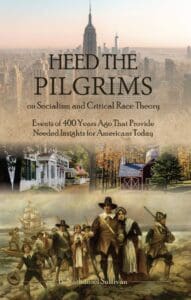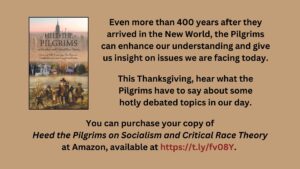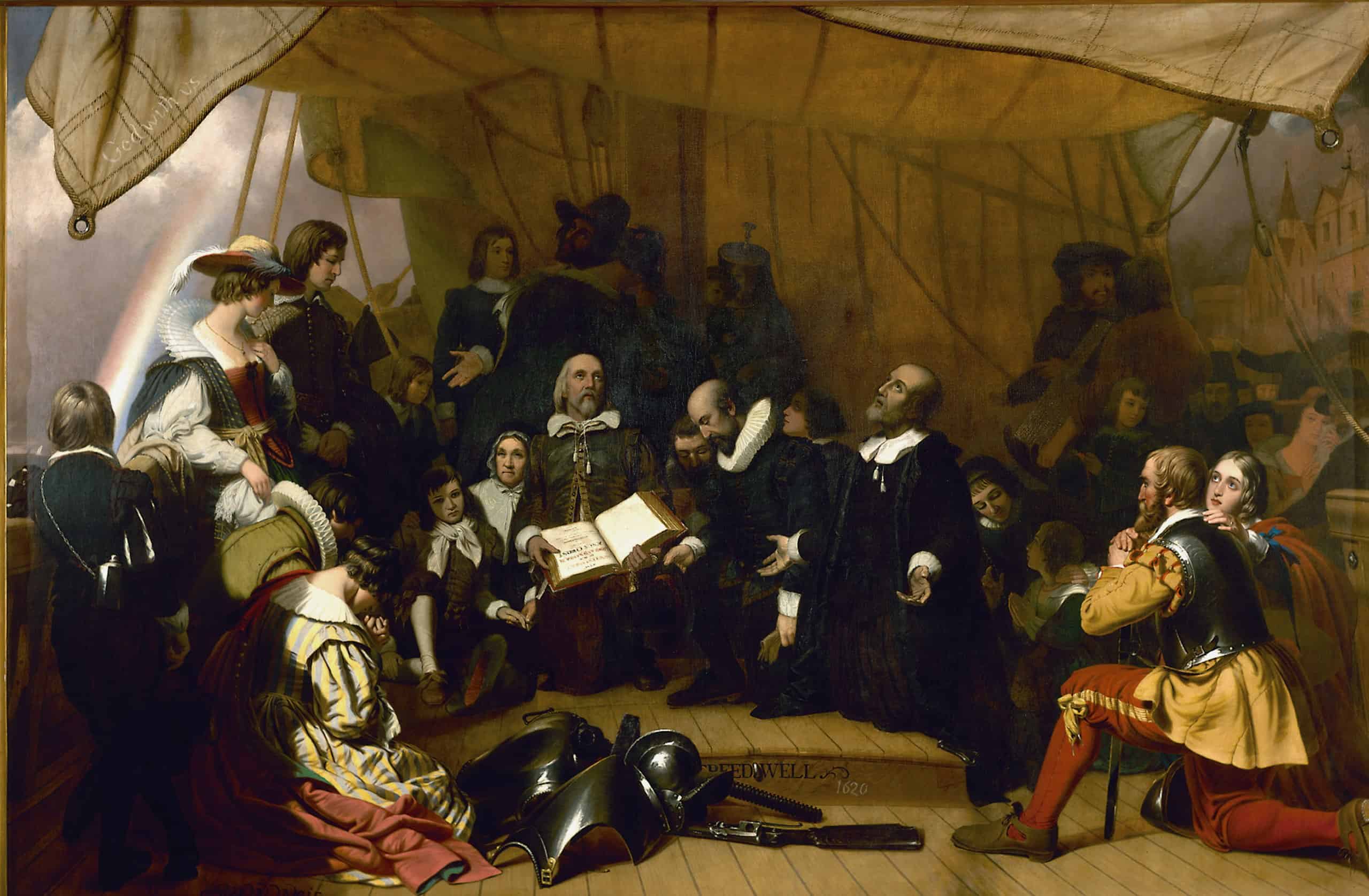[T]he face of things was changed, to the rejoicing of the hearts of many for which they blessed God.
—William Bradford, Governor of the Plymouth Colony—
The audio clips presented in this article are designed to be used in connection with this online discussion guide. A printable copy of the guide is available for download here.
 You may know that from 1621 to 1623, the Pilgrims lived under a communal arrangement that today we would call socialism. This discussion guide is based on a Word Foundations article titled “Ditching Socialism in the New World: A Lesson for 21st-Century Americans,” and chapter 1 of Heed the Pilgrims on Socialism and Critical Race Theory. These are essentially identical, and they offer readers a paraphrase of William Bradford’s account of what occurred during the 2-year period he and his fellow settlers endured socialism.
You may know that from 1621 to 1623, the Pilgrims lived under a communal arrangement that today we would call socialism. This discussion guide is based on a Word Foundations article titled “Ditching Socialism in the New World: A Lesson for 21st-Century Americans,” and chapter 1 of Heed the Pilgrims on Socialism and Critical Race Theory. These are essentially identical, and they offer readers a paraphrase of William Bradford’s account of what occurred during the 2-year period he and his fellow settlers endured socialism.
An audio edition of “Ditching Socialism” is available for download here. It is eighteen-and-a-half minutes long and read by Micah Sample. You do not have to have read or heard the article to use the discussion guide; audio clips relating the most important elements in the story are provided below. The combined time for all eight clips is just over nine minutes.
Suggestion: After Thanksgiving dinner or at some other point during Thanksgiving Day itself or the holiday period, call everyone together and use this discussion guide to learn about and to explore what happened to the Pilgrims. We can more fully appreciate their attitude of thankfulness if we know the kinds of challenges they had endured. Listen to each audio clip, then use the suggested discussion items to share reactions and insights. Ideas for discussing the content covered in the audio clips have been intentionally designed to be brief; however, more lengthy conversations can occur if your group would like to have them.
A reasonable amount of time to allot for this exchange of thoughts and ideas between family and friends is about 30 minutes. Try it! You’ll learn, not only about the Pilgrims, but also about history, freedom and liberty, and biblical teachings on work, responsibility, and gratitude. In addition, some misconceptions and myths about socialism — an increasingly popular ideology today — just might fade under the light of truth. Keep in mind, though, that this is a time to learn and share about what happened to the Plymouth settlers and why, not a time to argue!
Clip #1
The Mayflower Compact — Societal Order Is Important
length of clip: 1:43 (sometimes the readings on the audio bands are inaccurate)
Discuss: Governor Bradford wrote, “Unity and harmony had to be preserved. If we didn’t stick together, we wouldn’t survive!” Ask the members of your group to describe how important it was for order to be maintained. Ask: What were some of the risks if laws that were made were not respected and obeyed?
Clip #2
The Communal Arrangement — The Guidelines
length of clip: 0:57
Ask: Without private property, why might more people than usual try to dodge work? Discuss, then say: Let’s see what Bradford had to say.
Clip #3
The Communal Arrangement — The Injustices
length of clip: 1:26
Discuss: Why weren’t the mutual friendships and camaraderie that existed among the Pilgrims enough to make the communal system work?
Clip #4
The Emotional Appeal of Socialism — And the Harsh Reality that it Doesn’t Work
length of clip: 1:13
Discuss: What about human nature conflicts with socialism?
Clip #5
Changing Direction
length of clip: 1:25
Ask: How can having the right to own and manage property and assets motivate an individual to engage in responsible and productive work? What are some Bible stories or passages that talk about ownership and stewardship of property and assets? Here are a few suggestions: Proverbs 12:11,24; 14:23; 21:5; Matthew 25:14-30. If your time is limited, read and briefly talk about Proverbs 12:11,24.
Clip #6
A Lifesaving Way
length of clip: 0:34
Share that Deuteronomy 8:18 says, “And you shall remember the Lord your God, for it is He who gives you power to get wealth, that He may establish His covenant which He swore to your fathers, as it is this day.” Point out that a biblical perspective on wealth and prosperity affirms becoming prosperous through hard work. Thus, becoming wealthy through diligent work is not sinful. Note that once families were assured that the crops they worked to produce would be theirs, they wanted to work. When the Pilgrims didn’t have that assurance, they made excuses not to work.
But what about the poor? someone will ask. This is a great question! Scripture does not forget about the poor and the otherwise disadvantaged. It commands God’s people to assist them (see Ps. 10:2; 41:1; 82:3-4; Prov. 14:21,31; 19:17; 21:13; 22:9). Listen to Clip #7.
Clip #7
Free to Prosper, Free to Share
length of clip: 0:42
Discuss: According to Ephesians 4:28, what is God’s plan for meeting people’s needs? Answer: People work to meet their own needs. They obey God’s commands, including “Don’t steal” and “Don’t covet” (see Ex. 20:15,17). They also meet the needs of their own family members. From their resources, they help the poor. Note that government isn’t mentioned in this verse, or anywhere else in Scripture, as a vehicle for helping the poor, or as an entity designed to meet anyone’s needs, for that matter. Observe: Government’s job is to maintain order in society by commending those who do right and by punishing those who do wrong — according to God’s standard of right and wrong (see Rom. 13:1-7; 1 Pet. 2:13-17; 1 Tim. 2:1-2).
Clip #8
Thankful to God
length of clip: 1:08
Observe: Working diligently to do well also means working diligently so one can do good and help others. However, the worker must never forget what Deuteronomy 8:18 tells us. God enables us to prosper by blessing our work.
Note that socialism does not acknowledge God or leave room to acknowledge God. Note the statements from Karl Marx cited below. Communism is socialism’s sister ideology.
-
-
- My object in life is to dethrone God and destroy capitalism.
- The theory of Communism may be summed up in one sentence: Abolish all private property.
- Communism begins where atheism begins.
-
Also share this: By contrast, under the free enterprise system, people are free not only to work hard and prosper, but also to recognize God’s blessing on their work and in their lives.
Say: That’s what they Pilgrims did in 1623, and it’s what we’re doing today.
Wrapping Up
Share that in an article appearing at hawaiifreepress.com (PDF file here), Jim O’Keefe writes that for two grueling years, the Pilgrims
had tried collectivism and, finding it destructive to human nature, had changed course. The following November, 1623, saw a Thanksgiving Feast that was truly a celebration of abundance, a bounty created by the enterprise of free men and women, toiling on their own behalf and, in the process, creating a richer society. Today we call this system free enterprise, or the free market. Of all the things that have come down to us from the Pilgrims to today’s America, that is their most precious gift to us.
Conclude: Today, we can thank God for this priceless gift. Let us also work to preserve it.

Copyright © 2021 by B. Nathaniel Sullivan. All rights reserved.
All audio material available in this discussion guide copyright © 2021 by Micah Sample and B. Nathaniel Sullivan. All rights reserved.
top image credit: Pilgrims John Carver, William Bradford and Miles Standish at prayer during their voyage to North America. 1844 painting by Robert Walter Weir
